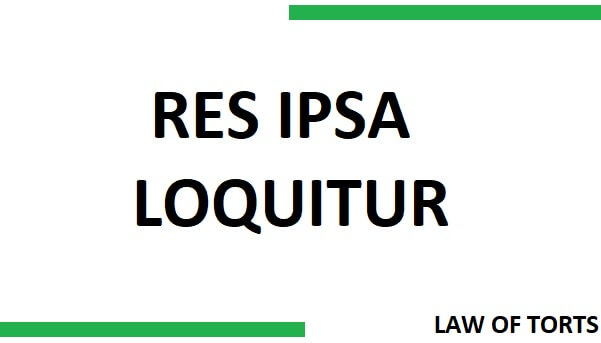Res Ipsa Loquitur : As a general rule, it is for the plaintiff to prove that the defendant was negligent. The initial burden of making out at least a prima facie case of negligence as against the defendant lies heavily on the plaintiff, but once this onus is discharged, it will be for the defendant to prove that the incident was the result of inevitable accident or contributory negligence on the part of the plaintiff.
If the plaintiff is not able to prove negligence on the part of the defendant, the defendant cannot be made liable. As observed by Lord Wensleydale in Morgan V. Sim :
The party seeking to recover compensation for damage must make out that the party against whom he complains was in the wrong. The burden of proof is clearly upon him, and he must show that the loss is to be attributed to the negligence of the opposite party. If, at the end, he leaves the case in even scales, and does not satisfy the court that it was occasioned by the negligence or default of the other party, he cannot succeed.
Direct evidence of the negligence, however, is not always necessary and the same may be inferred from the circumstances of the case. But when the plaintiff fails to establish a prima facie case, either by direct or circumstantial evidence that the defendant was negligent, the plaintiff’s action must fail.
Though, as a general rule, the plaintiff has to, discharge the burden of proving negligence on the part of the defendant, there are, however, certain cases when the plaintiff need not prove that and the inference of negligence is drawn from the facts. There is a presumption of negligence accordingly to the maxim ‘res ipsa loquitur’ which means ‘the thing speaks for itself.
When the accident explains only one thing and that is that the accident could not ordinarily occur unless the defendant had been negligent, the law raises a presumption of negligence on the part of the defendant.
In such a case, it is sufficient for the plaintiff to prove accident and nothing more. The defendant can, however, avoid his liability by disproving negligence on his part. For the maxim res ipsa loquitur to apply, it is also necessary that the event causing the accident must have been in the control of the defendant.
Thus, when the circumstances surrounding the thing which cause the damage are at the material time exclusively under the control or management of the defendant or his servant and the happening is such as does not occur in the ordinary course of things without negligence on defendant’s part, the maxim applies and the burden of proof is shifted from the plaintiff to the defendant.
Instead of the plaintiff proving negligence, the defendant is required to disprove it. The principle has been thus explained in Halsbury’s Laws of England.
“An exception to the general rule that the burden of proof of the alleged negligence is in the first instance on the plaintiff occurs wherever the facts already established are such that the proper and natural inference immediately arising from them is that the injury complained of was caused by the defendant’s negligence, or where the event charged as negligence ‘tells its own story’ of negligence on the part of the defendant, the story so told being clear and unambiguous. To these cases, the maxim res ipsa loquitur applies. Where the doctrine applies, a presumption of fault is raised against the defendant, which, if he is to succeed in his defence, must be overcome by contrary evidence, the burden on the defendant being to show how the act complained of could reasonably happen without negligence on his part.”
It is to be noted that as a rule, mere proof that an accident has occurred, the cause of which is unknown, is not evidence of negligence, but the peculiar circumstances constituting the accident in a particular case, may themselves proclaim, in clear and unambiguous voice, the negligence of somebody as the cause of the accident. It is to such cases that the maxim res ipsa loquitur may be said to apply.
| Read Also |
| Breach of duty in tort law |
| Professional negligence in tort law |
| Understanding the law of torts bare act |






